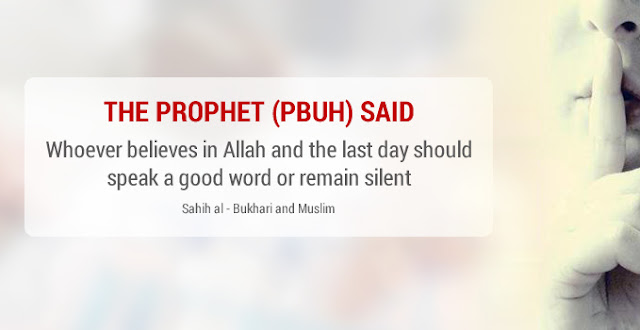It’s not weakness to remain silent
A man reviled Abu Bakr in the presence of Prophet Muhammad (peace be upon him). The Prophet remained seated. He looked pleased and smiled. He insulted Abu Bakr twice, but Abu Bakr controlled himself and remained silent. He insulted him for a third time, and Abu Bakr then let his tongue loose and responded back. At that, the Messenger of Allah got up and left.Abu Bakr followed after the Prophet and said: “Messenger of Allah! He insulted me and you just sat there. Then when I responded to some of what he said, you became angry and got up.” The Prophet said: “There was an angel with you who was responding to his insults on your behalf.”
Then the Prophet said: “Abu Bakr, (keep in mind) three things which are always true, one of which is that whenever a person is subjected to an injustice but leaves the matter to Allah, then Allah will come to his aid… .” (Musnad Ahmad)
It is not a weakness to remain silent. It takes real strength. What others say will only hurt you if you let it. Construct within yourself a “refuse treatment plant” and try to turn other people’s insults into something constructive and positive that you can use for your own betterment and the betterment of others.
Prophet Muhammad (peace be upon him) told us a story about a baby who spoke in its infancy. While the baby was suckling on its mother’s breast, a man on an expensive, magnificent horse rode by. The mother said: “O Allah! Make my son turn out to be like that man.”
At that point, the baby left off his mother’s breast, looked at the man, and said: “O Allah! Do not make me like him.”
The mother carrying her child then came across a young servant girl who was being stoned by a crowd shouting out at her that she was an adulteress and a thief. The mother said: “O Allah! Do not let my son turn out like that woman.”
The baby stopped suckling again and looked at the servant girl and said: “O Allah! Let me turn out like her.” The mother asked the baby why he said those things. He replied: “That man you saw was a wicked tyrant, and that servant girl who was accused of committing fornication and stealing neither committed fornication nor stole anything. That is why I asked Allah to make me like her.” (Sahih Al-Bukhari and Sahih Muslim) There are a lot of well-known stories about people who kept quiet in the face of accusations and insults. Some people do not feel the need to defend themselves and clear their names.
One of these stories pertains to the celebrated Japanese philosopher Hakuin Ekaku. His neighbor’s teenage daughter fell pregnant, and when her enraged parents confronted her about it, she said that Hakuin was the father. News of the shameful deed spread far and wide, even overseas, and the philosophers’ reputation was ruined. However, it did not trouble him in the least, though people stopped coming to see him.
When the baby was born, they brought it to him and said: “You are its father, so you have to look after it.” He took the child and cared for it. A year later, wracked by feelings of guilt, the girl admitted that the real father was the young man who worked at the shop.
The girl’s parents went back to the philosopher full of apologies. They said: “We have come to take back the baby.” He returned the child to them without saying a word.
There is a similar story in the Muslim world, that of Jurayj the Pious.
When someone criticizes you, insults you, or calls you names, do not respond. Do not try to defend yourself. Allow yourself to appear at a loss. See the positive effect that this has on you. As Allah said to Mary when she gave birth to Jesus: “And if you see any person, say: Lo! I have vowed a fast unto the Beneficent, and I may not speak this day to any mortal.” (Qur’an, 19:26)
For a few moments, let yourself feel that your stature has diminished. Then you will feel as if something mighty inside you has woken up and you will know that you have not diminished in the least.
I have many times found myself the brunt of people’s abuses. Sometimes the arrows that were aimed at me were friendly fire. I found nothing more consoling in such situations than keeping quiet and saying to myself: “Allah is sufficient for me, and He is the best one for me to trust my affairs.”
It is not good for you to get into the fray when the sides are unclear, and when those who are ignorant are mixed in with those who have knowledge. When tempers settle down, that is the time to comment on the situation.
Speaking when tensions are high and issues are unclear can simply confuse matters further. You might say things you do not mean and that you cannot easily retract. You are more likely to have your worlds misunderstood even if they are true. You are more likely to alienate and drive away the very people whom you are trying to convince.
Also keep in mind that silence can sometimes be egotistical.
This is something we need to be aware of. It can become an expression of arrogance, aloofness, and disdain for others. Do not use silence be a way to act haughtily and put other people down. Silence is a form of expression, and can be used for better or for worse, so endeavour to use it only to further goodness and truth.
Article by: www.arabnews.com

No comments:
Post a Comment